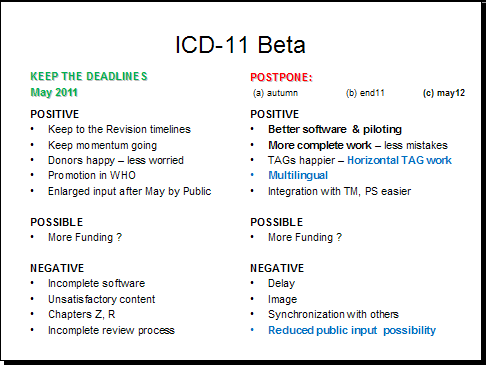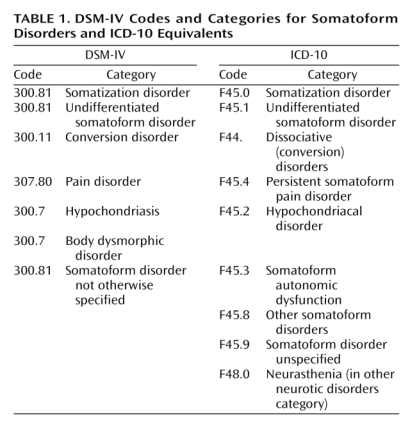ICD-11
Information on this page is archived. See Tab ICD-11 2018 for information on the release of a version of ICD-11 MMS on June 18, 2018.
If you are looking for recent information on proposals for the revision of ICD-10 Somatoform Disorder categories or on PVFS, ME and CFS please pull up posts through the Post Index or the ICD-11 Category tab or ICD-11 Beta Draft Category tab.
Archived content
ICD-11 Revision Timeline
The revision of the current version of ICD (ICD-10) and the development of the structure for ICD-11 began in 2007.
The original dissemination date for ICD-11 had been 2012, with the timelines for the revisions of ICD-10 and DSM-IV running more or less in parallel.
Sources: Exhibit 1 WHO Letter August 07 Page 4, ICD-11 Provisional Action Plan and Resource Needs;
IUPsyS March 08 Agenda 25 ICD-10 COMMITTEE ON INTERNATIONAL RELATIONS ACTION, March 28–30, 2008, Agenda Item No. 25: Revision of the International Classification of Diseases (ICD-10) and Involvement of Psychology
Slipping timelines
Very early on in the revision process, the ICD-11 dissemination date was extended from 2012 to 2015, with pilot implementation in 2014.
In order to be ready for global dissemination in 2015, the technical work on ICD-11 would need to be completed in 2012. Source: Dr Geoffrey Reed, Ph.D., personal correspondence
In mid 2009, the plan had been for the Alpha draft to be completed by May 2010; a “Beta I” by May 2011; a “Beta II” by May 2012, when field trials would commence; submission to WHA in 2014, for implementation from January 2015.
By September 2010, it was evident from ICD Revision meeting materials that targets for the population of content and the development of software had slipped; the Alpha drafting stage was running significantly behind schedule and an interactive Beta drafting platform looked unlikely to be ready for release by May 2011.
In early 2011, ICD Revision and WHO-FIC were discussing the pros and cons of postponing the launch of a Beta platform until later in the year or until May 2012, and whether an interim solution might be to launch “a hybrid model of opening the revision process to public comment and suggestions at the same time not a full scale beta phase with field trials…”
Sources: Slide presentation: ICD Revision Paediatrics Meeting, Ankara, Turkey, February 28 – March 1, 2011;
Report: WHO-FIC Council conference call, February 16, 2011: Page 6: PDF for Report
According to the current ICD-11 Timeline, the Beta drafting platform has been rescheduled for May 2012. It isn’t known whether drafting and software is sufficiently advanced to meet this target.
With the Alpha and Beta stages already running a couple of years behind the 2009 targets, it’s not clear how much time can now be allocated for the Beta drafting phase or for the ICD-11 field trials – if the implementation date of 2015 is going to be met.
In this 02.16.12 report from Tom Sullivan, Chris Chute (Chair, ICD-11 Revision Steering Group), warns of a possible shift in the projected completion date for ICD-11 from 2015 to 2016.
See Post #69: ICD-11 Revision struggling to meet targets for release of Beta Draft in May
The timeline for DSM-5 has also slipped. American Psychiatric Association (APA) originally planned to publish DSM-5 in May 2012. But in a press release issued in December 2009, APA announced it was postponing publication for a further year, until May 2013, to allow better linkage with ICD-10-CM and “more time for public review, field trials and revisions.”
According to American Psychiatric Association (APA) Press Release No. 09-65:
APA will continue to work with the WHO to harmonize the DSM-5 with the mental and behavioral disorders section of the ICD-11. Given the timing of the release of both DSM-5 and ICD-11 in relation to the ICD-10-CM, the APA will also work with the CDC and CMS to propose a structure for the U.S. ICD-10 CM that is reflective of the DSM-5 and ICD-11 harmonization efforts. This will be done prior to the time when the ICD-10-CM revisions are “frozen” for CMS and insurance companies to prepare for the October 1, 2013, adoption.
The US specific, ICD-10-CM, is now subject to a partial code freeze. More information here on the implications for partial code freeze for the adding of new categories and codes to ICD-10-CM.
Assuming APA sticks to its slated publication date of May 2013, DSM-5 will publish four months ahead of ICD-10-CM.
The current timeline for ICD-11 is here. Any revisions will be posted on the Dx Revision Watch ICD-11 Timeline page.
Assuming both timelines remain on target, ICD-11 isn’t anticipated to be ready for pilot dissemination until two years after DSM-5 is published and possibly later, if it continues to slip targets.
With the three systems: DSM-5 (ETA May 2013), ICD-10-CM (subject to partial code freeze since October 1, 2011 and due for implementation on October 1, 2013) and ICD-11 (currently scheduled for dissemination in 2015+) set to become potentially more closely aligned*, the proposed structure of ICD-11 may have implications for US patient populations, even though the US might not anticipate moving on to ICD-11 (or a clinical modification of ICD-11) until possibly 2020+.
*A June, 2011 Powerpoint Presentation by APA President, John Oldham, MD, MS, states, “Negotiations in progress to ‘harmonize’ DSM-5 with ICD-11 and to ‘retro-fit’ these codes into ICD-10-CM; ICD-10-CM codes will be ‘frozen’ on October 1, 2011, to allow insurance companies to reprogram and to train professionals to use new codes; DSM-5 publication scheduled for 2013, but it needs to include ICD-10-CM ‘F-codes’ in order to process all insurance claims beginning October 1, 2011”
Will ICD-11 be implemented worldwide from 2015 onwards?
No. In addition to the US, several other countries have been authorized by WHO to develop their own country specific “Clinical Modifications” of ICD-10. Canada uses an adaptation called ICD-10-CA, with a version published for 2009. Germany uses an adaptation called ICD-10-GM; Australia uses an adaptation called ICD-10-AM.
The US currently uses a clinical modification based on WHO’s long since retired, ICD-9. But instead of moving onto ICD-11 once the revision of ICD-10 has been completed, the US will be implementing a clinical modification of ICD-10, on October 1, 2013, and may not move onto ICD-11 (or a clinical modification of ICD-11) until 2020+.
Source: http://www.fimed.com/blog/tag/icd-11/
Canada is anticipated to move onto ICD-11 (or a modification of ICD-11) post 2018. Australia is anticipated to move onto ICD-11 (or a modification of ICD-11) before Canada and the US.
There are disparities between some of the proposed codings for the forthcoming ICD-10-CM and those in ICD-10: for example, the chapter placement and coding for the indexing of Chronic fatigue syndrome in ICD-10 differs from the proposed chapter placement and coding in the forthcoming ICD-10-CM.
Resources for US Clinical Modification:
CDC site: International Classification of Diseases, Tenth Revision, Clinical Modification (ICD-10-CM)
2012 release of ICD-10-CM is now available and replaces the December 2011 release [1].
For current proposals for ICD-10-CM see my reports in Post #118 and Post #129
[1] Although this release of ICD-10-CM is available for public viewing, the codes in ICD-10-CM are not currently valid for any purpose or use. The effective implementation date for ICD-10-CM (and ICD-10-PCS) is October 1, 2013. Updates to this version are anticipated prior to implementation of ICD-10-CM.
Production of ICD-11
This PDF document sets out the overall process for the 11th revision of ICD:
Production of ICD-11: The overall revision process March 2007
News Release WHO/13 16 April 2007
Revision of the International Classification of Diseases (ICD)
“The ICD is the global standard to report and categorize diseases, health-related conditions and external causes of disease and injury in order to compile useful health information related to deaths, illness and injury (mortality and morbidity).
“The design of the ICD has a direct impact on health care. It influences public health programmes, prevention, reimbursement and treatment. Countries use it to compile basic health statistics and to monitor health spending. To compare findings between countries, a common standard is needed. Emerging diseases and scientific developments, advances in service delivery, and changes in health information systems require a revision of ICD. One major need is to improve the relevance of the ICD in primary care settings. Another key driver is the development of computerized health information systems…”
“Harmonization” and integration of ICD-11 with DSM-5
The WHO is revising the classification of mental and behavioural disorders as a part of the overall revision of ICD-10.
There is already a degree of correspondence between some sections of DSM-IV and Chapter V of ICD-10. For the next editions, the APA and the WHO have committed as far as possible:
“To facilitate the achievement of the highest possible extent of uniformity and harmonization between ICD-11 mental and behavioural disorders and DSM-V disorders and their diagnostic criteria.”
with the objective that
“The WHO and APA should make all attempts to ensure that in their core versions, the category names, glossary descriptions and criteria are identical for ICD and DSM.”
WHO acknowledges there may be areas where these objectives may not be achievable.
The APA participates with the WHO in the International Advisory Group for the Revision of ICD-10 Mental and Behavioural Disorders. In 2009, there was also a DSM-ICD Harmonization Coordination Group.
The functions of the DSM-ICD Harmonization Coordination Group were set out thus:
• To identify effective mechanisms to share information on developmental processes of the two diagnostic systems.
• To find strategies to narrow the differences between the two diagnostic systems.
• To coordinate efforts towards harmonization of the two diagnostic systems by making specific recommendations to the respective decision making bodies.
• To provide a forum in which difficult issues around harmonization can be discussed and common approaches identified.
One focus of this site is the monitoring of the revision of the Somatoform Disorders categories for ICD-11 and the corresponding Somatoform Disorders in DSM-IV, and the potential “harmonization” of these sections.
This (simplified) table sets out how DSM-IV and ICD-10 categories currently correspond.
Current DSM-IV Codes and Categories for Somatoform Disorders and ICD-10 Equivalents
Source: Mayou R, Kirmayer LJ, Simon G, Kroenke K, Sharpe M: Somatoform disorders: time for a new approach in DSM-V. Am J Psychiat. 2005;162:847–855.
The DSM-5 Work Group charged with the revision of these DSM-5 categories proposes to rename the Somatoform Disorders to “Somatic Symptom Disorders” and combine a number of existing categories (somatization disorder, hypochondriasis, some classes of pain disorder, and undifferentiated somatoform disorder) under a new rubric, by creating a portmanteau category “Complex Somatic Symptom Disorder.”
If approved, these radical proposals by the DSM-5 Somatic Symptom Disorders Work Group would effect a major restructuring of the existing DSM-IV categories.
It is difficult to see how ICD Revision might accommodate these radical proposals within ICD’s more rigid taxonomic framework – even if WHO classification experts, ICD Revision Steering Group and the ICD-11 Topic Advisory Group for Mental and behavioural disorders were to consider these proposed new categories and criteria valid constructs.
The Work Group’s Rationale/Validation document fails to address the issue of whether harmonization between these sections of the two classification systems might be viable under current Work Group proposals. Nor does it consider the implications for incongruency on the operational and clinical utility of this section of the forthcoming DSM-5.
Continued on Page 2: Revision Steering Group; Topic Advisory Groups; iCAT; Alpha Browser; Content Model; ICD-11 YouTubes; Key ICD-11 links and resources
Pages: 1 2


